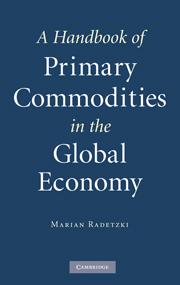Book contents
- Frontmatter
- Contents
- List of figures
- List of tables
- Acknowledgments
- Introduction
- 1 The historical framework
- 2 The geography of commodity production and trade
- 3 Comparative advantage and the trade policy distortions
- 4 Price formation and price trends in commodities
- 5 The commodity exchanges, commodity investments, and speculation
- 6 The economics of exhaustible resource depletion
- 7 Fears of, and measures to assure, supply security
- 8 Producer cartels in international commodity markets
- 9 Public ownership in primary commodity production
- 10 The monoeconomies: issues raised by heavy dependence on commodity production and exports
- References
- Index
8 - Producer cartels in international commodity markets
Published online by Cambridge University Press: 23 June 2009
- Frontmatter
- Contents
- List of figures
- List of tables
- Acknowledgments
- Introduction
- 1 The historical framework
- 2 The geography of commodity production and trade
- 3 Comparative advantage and the trade policy distortions
- 4 Price formation and price trends in commodities
- 5 The commodity exchanges, commodity investments, and speculation
- 6 The economics of exhaustible resource depletion
- 7 Fears of, and measures to assure, supply security
- 8 Producer cartels in international commodity markets
- 9 Public ownership in primary commodity production
- 10 The monoeconomies: issues raised by heavy dependence on commodity production and exports
- References
- Index
Summary
Producer cartels are about monopolistic coordination aimed at raising the suppliers' revenues. Efforts to cartelize typically come in waves, and have occurred throughout the history of international commodity trade. This chapter focuses on the 1970s, when the most recent wave occurred. While it lasted, a number of academic efforts were launched to explain the functioning of commodity cartels in general and of OPEC in particular. Despite the theoretical developments and the many modeling exercises that were undertaken, many of the key issues concerning commodity cartelization remain to be fully understood. The remark from an influential survey of commodity cartelization from the mid-1980s (Gately, 1984), that “There are a large number of alternative theories, but a much smaller number of sensible applied models,” retains its validity even twenty years after it was published.
The present chapter begins by studying the necessary minimum preconditions in terms of elasticities and market shares, for successful cartel action. I then identify the markets where these preconditions appear to be fulfilled. There follows a brief account of the attempts of commodity producers to wield the market power to their own benefit, trying to answer questions such as: What were the triggers to the cartel action? How did it go? How did the buyers react? What prompted cartel disintegration? There is a heavy emphasis on the oil cartel, and an effort to explain why OPEC has persevered while the other cartel efforts failed.
- Type
- Chapter
- Information
- A Handbook of Primary Commodities in the Global Economy , pp. 144 - 165Publisher: Cambridge University PressPrint publication year: 2008
- 2
- Cited by



